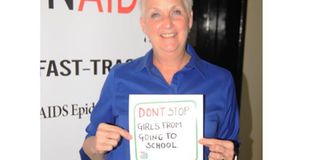Anti-discrimination campaign on as world marks Zero Discrimination Day

The United States Ambassador to Uganda Deborah Malac joins campaign against discrimination
What you need to know:
Ms Vivian Serwanja, the Public Relations Officer (PRO) of the ministry of health (MoH) says that discrimination or any other form of stigma is discouraged amongst the positively living, mentally ill, sicklers, the disabled and other vulnerable groups.
In an effort to fight discrimination particularly of people living with HIV/Aids, UNAIDS, United Nations joint Programme on the scourge, is drumming up messages under the hashtag, #zerodiscrimination. This is part the campaign to mark the Zero Discrimination Day.
According to UNAIDS Country Director, Amakobe Sande, the day is an opportunity to highlight how everyone can be part of the transformation and take a stand for a fair and just society.
Robinah Kyazze, a senior counsellor with Aids Information Centre (AIC) classifies discrimination into two; by others towards one living Aids and by the person himself because of their status or doubt of their status.
In an interview with Daily Monitor, UNAIDS’ Country Director said that even if there have been a couple of strides taken with science to fight the HIV/Aids scourge, people living with the virus continue to suffer stigma and discrimination openly at health facilities.
For example, she says that 27 per cent of people living with Aids have been verbally or physically discriminated.
“We are not doing enough. We need to do much more. The science has advanced tremendously. We now have people living with HIV but are living productive lives because they are on medication. Over the period, the evidence of what works has also increased dramatically and we know the kind of programmes to bring together in order to achieve epidemic control,” Sande explains.
UNAIDS is driving towards zero HIV infections, zero Aids related deaths and zero discrimination. “We have made quite a lot of progress on the first two zeros,” she says, adding that there is need to reflect on why, in an era with medication, people continue dying of Aids related illness.
“Health-care settings should be safe and supportive environments. It is unacceptable that discrimination is inhibiting access to care today,” said Mr Sidibé. He added, “Eliminating discrimination in health-care settings is critical, and we must demand that it become a reality.”
At the end of 2015, according to UNAIDS figures, 83, 000 new infections per the year were reporting which meant approximately 230 infection per day. That year, there were 28, 000 deaths thus an estimated 76 deaths per day.
Though the Zero Discrimination Day underscores discrimination against those living with HIV/Aids, it has many forms, from racial or religious discrimination to discrimination based on gender, sexual orientation or age, and to bullying at school.
Ms Vivian Serwanja, the Public Relations Officer (PRO) of the ministry of health (MoH) says that discrimination or any other form of stigma is discouraged amongst the positively living, mentally ill, sicklers, the disabled and other vulnerable groups.




